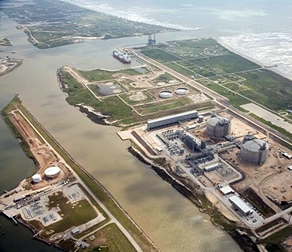US LNG exports pave way to Asian spot market
By MARI IWATA
TOKYO -- Japanese liquefied natural gas buyers see US government approval for an LNG facility in Texas to export gas to countries with which it doesn't have free-trade agreements as a step forward in the creation of a spot market for the clean-burning fuel in Asia.
Cargoes from the Freeport LNG export terminal "will help bring about structural changes to the Asian LNG market," a Chubu Electric Power Co. spokesman said Monday by telephone.
Freeport LNG has signed preliminary 20-year contracts to sell the supercooled gas to two Japanese buyers -- Chubu Electric and Osaka Gas. The deal was contingent on government approval for non-FTA countries, including Japan.
 Optimism in the US over the prospect of energy self-sufficiency after domestic natural gas production surged in recent years thanks to new drilling techniques quickly gave way to concerns about a glut that was driving prices lower, then hopes that new markets could be tapped in Asia, where the price of gas is a multiple of the fuel's price in the US.
Optimism in the US over the prospect of energy self-sufficiency after domestic natural gas production surged in recent years thanks to new drilling techniques quickly gave way to concerns about a glut that was driving prices lower, then hopes that new markets could be tapped in Asia, where the price of gas is a multiple of the fuel's price in the US.
But the future of exports hinges on government approval of around a score of applications from projects eager to export to non-FTA countries, and the Freeport approval is being interpreted as a sign of further openness.
For Asian buyers, the shift could mean an end to reliance on inflexible long-term contracts that commit them to receive practically all the cargoes they have agreed upon, with no reselling permitted.
Freeport LNG doesn't commit importers to resell unneeded volumes, which could be a game-changer in Asia, where traditional contract terms have restrained the development of a spot market.
The viability of the Freeport deal "will give us more bargaining power in talks with other producers," an Osaka Gas spokesman told The Wall Street Journal.
Chubu Electric and Osaka Gas signed contracts last summer to use Freeport's liquefaction facility, with each committed to use of 2.2 million tpy of its LNG capacity to process natural gas they buy in the North American market. Osaka Gas also has a 10% stake in Freeport LNG Development, the facility's operator.
Freeport is the second LNG project the Obama administration has approved for exports to non-FTA countries after the Sabine Pass, La., which it approved in May 2011 and is slated to start exporting in 2015.
The $10 billion Freeport LNG project is scheduled to start commercial operations in 2017.
Japan Research Institute Senior Economist Mitsuo Fujiyama said the Freeport approval augurs well for a spot market with sufficient liquidity to sustain itself.
"For it to come to pass, participation from existing LNG sellers such as Qatar, Russia and Australia will be necessary," he said.
Other Japanese LNG buyers have contracted with separate LNG projects -- subject to US government approval -- on terms similar to those agreed upon between Freeport and its Japanese customers.
Japan is the largest Asian importer of LNG, but by no means the only energy-hungry country in the region with an interest in a spot LNG market.
Singapore received its first commercial delivery of LNG early this month and plans to nearly double its throughput capacity to 6 million tpy by the end of this year -- and add an additional 3 million tpy in an unspecified time frame.
Recently, the International Energy Agency pointed to Singapore, Japan and South Korea as places in Asia well-suited to become gas trading centers.
Dow Jones Newswires






Comments